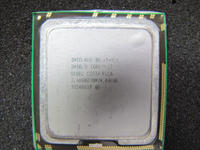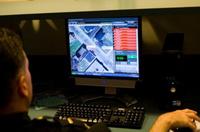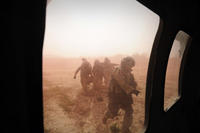-
Industry: government hampering efforts to fight counterfeit chips

Representatives from the semiconductor industry said that new Treasury Department and U.S. Customs and Border Protection (CBP) policies have made it difficult to assist the Pentagon in its struggle to keep counterfeit computer components out of its supply chain; Brian Toohey, the president of the Semiconductor Industry Association, a lobbying group, said that new policies introduced in 2008 by the Treasury Department and CBP have made it difficult for manufacturers to identify counterfeit products
-
-
Boeing and Siemens join forces to protect smart grid
In a bid to improve efficiency and security for the Pentagon’s electrical “smart grid,” defense giant Boeing has teamed up with German technology conglomerate Siemens to develop new technologies
-
-
Microsoft offers $250,000 in cybersecurity competition
Last Wednesday at the annual Black Hat and Defcon convention for hackers, Microsoft announced a competition for cyber security specialists in which it would award $200,000 to the individual who develops the most innovative computer protection technology
-
-
Dow fined $2.5 million for violations at Michigan chem plant

Due to environmental and safety violations at its chemical plant in Midland, Michigan, Dow Chemical will have to pay $2.5 million in fines; federal inspectors found that the chemical plant violated air, water, and waste regulations between 2005 and 2007
-
-
Thales’s Liberty LMR completes Department of Interior tests

Thales’s Liberty LMR has passed U.S. Department of Interior tests; the radio had earlier been approved for Law Enforcement and Tiers 1, 2, and 3; the company says the Liberty LMR, a software-defined radio solution, enables interoperability across all public safety bands, linking government agencies and first responders with a single portable radio
-
-
Listening to the sound of bullets

ShotSpotter systems relies on a system of acoustic sensors to identify the location from which a shot has been fired; the alerts are immediately conveyed to police dispatchers, 911 operators, and sometimes to officers in the field via laptops in patrol cars; the system includes a computer program which displays a comprehensive bird’s-eye view of the area, marking the location of the incident with a red dot and indicating the time and number of rounds fired
-
-
Disasters take toll on PartnerRe’s profits
On Monday PartnerRe Ltd., the international reinsurer, announced that its second quarter earnings fell 35 percent as a result of the devastating natural disasters that struck around the world
-
-
Blast gauge gives medics, doctors critical information

Researchers are working to enhance the safety of soldiers in the field through the development of a device that monitors the physical impacts of exposure to an explosive blast; 188,270 service members have suffered a traumatic brain injury in the last decade; the extent of injury is often difficult to discern, making diagnosis and selection of appropriate medical treatment challenging
-
-
Google acquires facial biometric company
Following Facebook’s decision to implement biometric facial recognition software, Google has acquired a company to boost its facial recognition capabilities; the search giant recently purchasd Pittsburgh Pattern Recognition (PittPatt), which develops technology that can search images and videos for a specific face
-
-
Averting bridge disasters: new sensors could save hundreds of lives
One of every four U.S. highway bridges has known structural problems or exceeded its intended life-span. Most only get inspected once every one or two years; University of Maryland researcher has developed a new sensor that measures indicators of a bridge’s structural health, such as strain, vibration, flexibility, and development of metal cracks; the sensors are expected to last more than a decade, with each costing about $20
-
-
Bio detection firm raises $14 million in stock deal
Last week PositiveID Corp.,a developer of biological threat detection technology and medical diagnostics, announced that it had signed a deal to raise almost $14 million in additional funding through the sale of its stock
-
-
Safran completes L-1 acquisition, becomes world’s biometric leader
In the latest series of purchases by traditional defense firms seeking to diversify their portfolios, French defense company Safran recently completed its $1 billion acquisition of biometric solution provider L-1 Identity Solutions making it the world’s market leader in biometrics
-
-
Turning sport vehicle into military machine
U.K. companies to transform a proven sports vehicle into a high performance, off road vehicle for special forces, border patrol, reconnaissance, rapid intervention or strike roles; the Wildcat 500 DKR boasts high speed performance in harsh environments
-
-
U.S. businesses want fewer restrictions on skilled foreign workers
On Tuesday representatives from two major U.S. companies, Microsoft and Nasdaq, headed to the Hill to testify before a Senate subcommittee on immigration policies and its effects on highly skilled foreign workers; speaking before the Senate Judiciary Subcommittee on Immigration, Refugees, and Border Security, Brad Smith, Microsoft’s general Counsel, urged lawmakers to ease restrictions and immigration laws for skilled overseas workers
-
-
Expanding Yuma flight testing schedule for Argus UAV
The World Surveillance Group (WSGI) revealed its plans of extending the flight testing schedule for its strange-looking Argus One UAV at the Yuma facilities at the U.S Army grounds in Arizona
-
- All
- Regional
- Water
- Biometrics
- Borders/Immig
- Business
- Cybersecurity
- Detection
- Disasters
- Government
- Infrastructure
- International
- Public health
- Public Safety
- Communication interoperabillity
- Emergency services
- Emergency medical services
- Fire
- First response
- IEDs
- Law Enforcement
- Law Enforcement Technology
- Military technology
- Nonlethal weapons
- Nuclear weapons
- Personal protection equipment
- Police
- Notification /alert systems
- Situational awareness
- Weapons systems
- Sci-Tech
- Sector Reports
- Surveillance
- Transportation
Advertising & Marketing: advertise@newswirepubs.com
Editorial: editor@newswirepubs.com
General: info@newswirepubs.com
2010-2011 © News Wire Publications, LLC News Wire Publications, LLC
220 Old Country Road | Suite 200 | Mineola | New York | 11501
Permissions and Policies
Editorial: editor@newswirepubs.com
General: info@newswirepubs.com
2010-2011 © News Wire Publications, LLC News Wire Publications, LLC
220 Old Country Road | Suite 200 | Mineola | New York | 11501
Permissions and Policies
